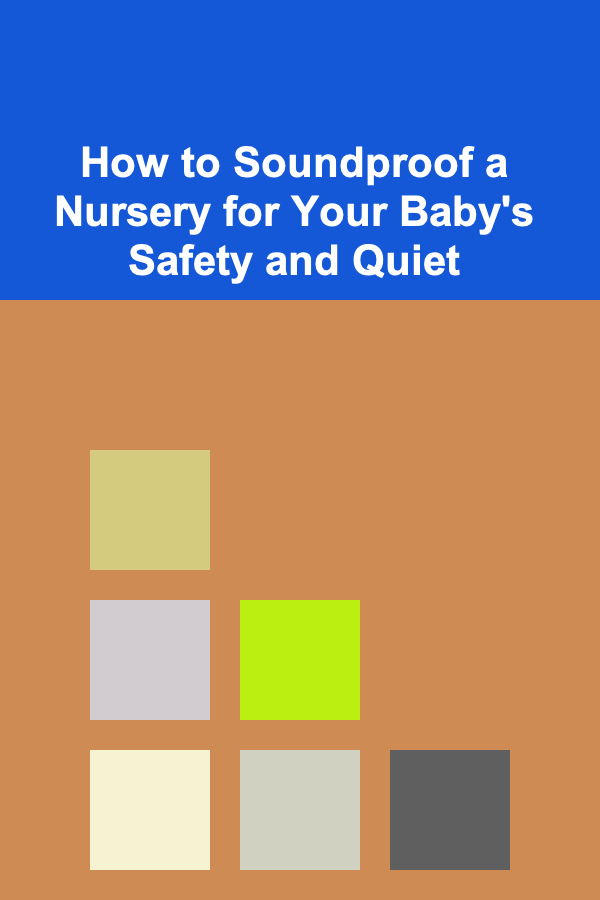
How to Soundproof a Nursery for Your Baby's Safety and Quiet
ebook include PDF & Audio bundle (Micro Guide)
$12.99$6.99
Limited Time Offer! Order within the next:

Creating a peaceful and safe environment for your baby is one of the most important considerations for any parent. While the safety and comfort of your nursery are essential, it's often the overlooked element of soundproofing that can make a big difference in your baby's well-being. A soundproofed nursery can protect your child from external noise, ensure they have a peaceful sleep, and even reduce the risk of hearing damage from loud noises.
In this comprehensive guide, we will explore why soundproofing a nursery is essential, various methods for soundproofing, materials you can use, and the steps to take to create the ultimate quiet space for your baby. Let's dive into how to achieve a peaceful nursery environment that promotes safety, comfort, and restful sleep.
Why Soundproof a Nursery?
Before we dive into the specifics of soundproofing a nursery, it's essential to understand why it's necessary. There are several factors that make soundproofing a nursery an important task:
1. Baby's Sleep and Health
Newborns sleep for most of the day, and their sleep is crucial for their growth and development. Unwanted noise can disrupt their sleep patterns, causing them to wake up frequently or remain in a light sleep state. Since babies are particularly sensitive to environmental factors like noise, the quieter the room, the better they can rest.
How Noise Affects Babies:
- Interrupting Deep Sleep: Babies spend a significant amount of time in REM sleep, a crucial phase for brain development. Sudden noises can disturb this stage and reduce the quality of sleep.
- Stress: Persistent noise exposure can lead to stress for babies. Their physiological response to noise might result in irritability, difficulty feeding, or even delayed development if sleep is continually disturbed.
2. Protection from Harmful Noise
Babies have sensitive hearing, and prolonged exposure to loud or sharp sounds, such as traffic, construction work, or even loud music, can potentially damage their developing ears. It is essential to protect your baby from sounds that may affect their hearing or cause discomfort.
Examples of Harmful Noises:
- Traffic Noise: Cars, buses, and trucks passing by the nursery can create constant disruptions.
- City Sounds: Urban environments often include loud noises from construction sites, sirens, or street performers.
- Household Sounds: If you live in a house with multiple family members, the noise of a washing machine, vacuum, or loud conversations might cause disturbances.
3. Enhancing the Parent's Peace of Mind
A soundproofed nursery not only benefits the baby but also helps the parents. Having a quiet space to put your baby to sleep ensures that parents can have some time to relax or work around the house without constantly worrying about noise waking the baby. A quiet environment can also help prevent parents from being stressed by the noise in their home.
Methods to Soundproof a Nursery
There are several strategies you can use to soundproof a nursery, depending on the level of soundproofing you need and your budget. Below are different methods, ranging from simple changes to more complex and permanent modifications.
1. Seal Gaps and Cracks
One of the easiest and most cost-effective ways to soundproof a nursery is to seal gaps and cracks. Sound can travel through even the smallest opening, so ensuring the nursery is sealed tightly can significantly reduce noise from the outside or other areas in the house.
Steps:
- Doors: Check for gaps around the door frame, especially at the bottom. A significant amount of sound can leak through these areas.
- Windows: Windows are often a major source of noise, especially in urban settings. Look for any gaps around the window frame and seal them with weatherstripping.
- Walls: Check the walls for cracks or holes. Even minor cracks can let sound pass through. Fill them with acoustic caulk or another sealant that is designed for noise isolation.
- Electrical Outlets: Sound can also escape through outlets. Install outlet gaskets to reduce noise leakage.
2. Soundproof the Windows
Windows are one of the most significant sources of noise leakage, especially in homes located in noisy environments. While you might not be able to replace windows immediately, there are several ways to enhance their soundproofing.
Techniques:
- Double-Glazing: If you're in a position to make a more significant investment, double-glazed windows are highly effective at blocking external noise.
- Soundproof Window Inserts: These are inserts that fit over your existing windows, creating an additional barrier against sound.
- Heavy Curtains: Thick, soundproof curtains can absorb noise and block out unwanted sounds. Look for curtains that are specifically designed for soundproofing, as they are made of dense, layered materials.
- Window Plugs: You can also make or purchase removable window plugs, which can be inserted into the window frames to block sound.
3. Soundproof the Walls
The walls of a nursery can transmit a great deal of noise. If you live in an apartment or a house with thin walls, this is one of the most critical areas to address. Soundproofing the walls may involve installing additional layers of materials or even modifying the walls.
Techniques:
- Mass Loaded Vinyl (MLV): MLV is a dense material that can be attached to the walls to block noise. It's effective at reducing both airborne and impact noise and is easy to install.
- Acoustic Panels: Acoustic panels made from foam or fiberglass are designed to absorb sound waves and reduce echo. They can be placed on the walls or ceiling.
- Drywall with Soundproofing Insulation: If you're doing a major renovation, you can add soundproof insulation to the walls or install additional layers of drywall with soundproofing materials like Green Glue.
- Resilient Channels: These are metal channels that decouple the drywall from the wall studs, reducing the transfer of sound.
4. Soundproof the Floors
Hardwood, tile, or laminate floors can cause sound to reverberate throughout the room. In addition to installing carpets or rugs, there are other ways to soundproof the floor.
Techniques:
- Carpet and Padding: Carpets and thick padding can reduce the transmission of both airborne and impact noise. Choose dense, heavy carpets that will absorb sound.
- Acoustic Underlayment: An acoustic underlayment is a soundproofing material that can be installed beneath the flooring to further reduce sound transmission.
- Floor Mats: For a more temporary solution, placing large floor mats or soft rugs over hard floors will help dampen sound.
5. Soundproof the Ceiling
In multi-story homes or apartments, sound can travel through the ceiling. Soundproofing the ceiling is particularly important if the nursery is located directly below another living area.
Techniques:
- Acoustic Tiles: Installing acoustic tiles on the ceiling can absorb sound and reduce the transfer of noise.
- Additional Layers of Drywall: Just like with the walls, adding an extra layer of drywall or soundproofing material like Green Glue to the ceiling can reduce sound transmission.
- Ceiling Baffles: These are materials that hang from the ceiling and absorb sound, similar to acoustic panels but specifically designed for ceiling installation.
6. White Noise Machines
While not a traditional form of soundproofing, white noise machines can help mask external sounds. White noise creates a consistent sound environment that drowns out sudden noises that may disturb your baby's sleep.
Benefits:
- Masking Noise: White noise can effectively mask sounds like traffic, sirens, or conversations from other rooms.
- Soothing for Babies: Many babies find the consistent sound soothing, and it can help them fall asleep faster and stay asleep longer.
7. Consider the Furniture and Decor
The type of furniture and decor in the nursery can also play a role in soundproofing. Soft materials like fabric and padded surfaces can absorb sound and reduce echoes, contributing to a quieter environment.
Tips:
- Use Soft Fabrics: Choose fabrics for curtains, cushions, bedding, and rugs that can help absorb sound.
- Add Bookshelves and Upholstered Furniture: Bookshelves filled with books or plush upholstered furniture can help reduce sound reflections and absorb noise.
- Avoid Hard Surfaces: Minimize the use of hard, reflective surfaces like glass tables or metal furniture that can amplify sound.
Conclusion
Soundproofing a nursery is a critical step in creating a calm, safe, and quiet environment for your baby. Whether you're trying to block out traffic noise or reduce the sounds of family members moving around the house, soundproofing ensures that your baby's sleep remains undisturbed and that they are protected from potentially harmful noises.
By using the strategies outlined above, you can effectively soundproof the nursery, ensuring that your baby's room is a peaceful haven for rest and development. From sealing gaps to installing acoustic materials and using white noise machines, there are many ways to create a quiet, serene space. Remember, the quality of your baby's sleep can have a significant impact on their health and development, so investing in a soundproofed nursery is a decision that will benefit both you and your child for years to come.
Other Products

How to Make a Checklist for Styling Products for Photography: A Comprehensive Guide
Read More
How to Plan a Family DIY Building Project
Read More
How to Serve Delicious and Easy Party Snacks at Home
Read More
How to Start a Daycare from Home and Make Extra Income
Read More
How to Teach Kids About Money Management from an Early Age
Read More